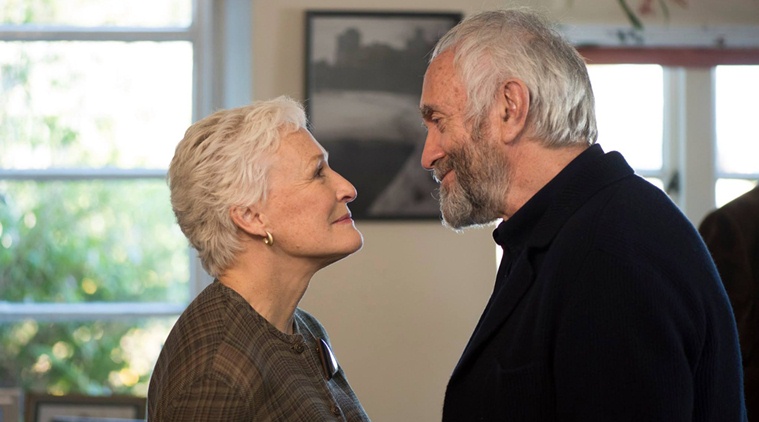
The Wife movie cast: Glenn Close, Jonathan Pryce, Christian Slater, Max Irons, Harry Lloyd, Annie Starke
The Wife movie director: Björn Runge
The Wife movie rating: 3 stars
In one of her most-loved books, Ai Ladki, Krishna Sobti wrote about a mother on her deathbed talking to her daughter about the many meanings of womanhood and wishing that if there was rebirth, she was born a man, to see just how it feels to be in control of one’s spouse and family. “It’s not a thing to laugh about,” the mother adds. “It goes very deep. Every woman understands this.”
If only every man knew.
In The Wife, a phenomenal Glenn Close gives you a glimpse — of the sacrifices that sustain a marriage, of the things that can’t be said, of the egos that need to be massaged, and the self that needs to be stifled. It’s almost always the woman who bears the heavier of that burden — of course a lot of time willingly. Sometimes she couches it as habit, sometimes as tradition, sometimes as duty, often as love.
Close’s Joan has done that all her life, leading up to the point that her husband, writer Joseph Castleman (Pryce), gets a Nobel Prize in Literature. The phone call breaking the news sees a fleet of emotions run across her face — there is happiness but also a glimpse of what could have been. What lies behind those thoughts is revealed drip by drip through The Wife, as layers are peeled off the marriage of the Castlemans.
The film is based on a novel of the same name by Meg Wolitzer. At first, the direction of Runge is as nuanced as their marriage. There is love there, and a sense of years spent together. A grateful Joseph doesn’t leave Joan out of any mentions, any photos as accolades flock to his door. Similarly, Joan is there standing by as Joseph reaches out for his pills, his reading glasses, someone to hand his coat to as they walk into gatherings, and to remind him to eat less and eat healthy. Joan does it without any rancour, noticing every little crumb that falls into his beard, to fondly brush it away.
It’s when the film needs to climb the next level, when words countless and what is unsaid more, that The Wife falters. The plot is driven by tired cliches such as Joan and Joseph’s early romance (the young Joan played by Close’s real-life, remarkably reticent daughter Annie Starke) as the talented student and the flirtatious professor; Joseph’s philandering ways; his neglect of their writer-son; and his casual dismissal of his wife hidden in condescending praise. The Swedish Runge spends unnecessary time laying out the grandeur of the Nobel Prize.
However, Close is another matter. In her hands, one gets a sense of the extent of Joan’s love, sacrifice, dedication, duty and pain, which the film can’t even begin to fathom. These can’t be fit into any of the neat boxes the story tries out. Close’s fierce eyes forcing you to look at them without flinching away, her torment at hiding a truth that could destroy Joseph and all that they have built together, her artistry in holding back a nosy writer (Slater) seeking to write Joseph’s biography and trying to ferret out “juicy details” by flirting with her, her incredulity as Joseph cites his “years of rubbing her back” as his contribution, her very act of breathing as she holds it all in during the Nobel presentation, and her despair at the hand that fate eventually deals her — it’s a woman, wife, mother, actor at the top of her art.
It’s a shame that Close currently holds the record for most Oscar nominations without a win. The timing would, of course, be perfect should the 71-year-old, nominated for the seventh time, win Actress in a Leading Role come February 24 — with Oscars buffeted with #MeToo, and the Nobel literature with a sex scandal. But it’s a shame if timing is what it would take for the Academy to recognise one of the most outstanding talents of our times — giving us some of its most remarkable women.
Close has said Fatal Attraction is due for a remake, this time telling the story from the point of view of Alex Forrest, one of her most remarkable roles, as the jilted, ‘crazy’ woman. Now that would be a real tribute.